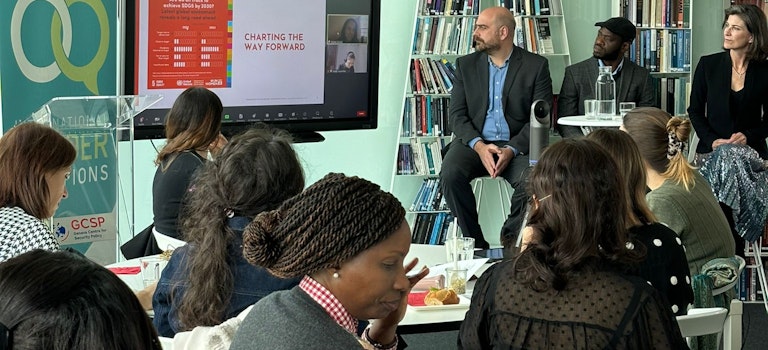On Tuesday 26 March, the IGC Secretariat held its second Lunch and Learn event of the year, focusing on the important topic of ‘Mapping gender (in)equality: The critical role of data’. The discussion delved into the intersections of gender and data, emphasising how individuals’ social identities and experiences shape the data collection process which is crucial for influencing policymaking.

The event showcased presentations from a diverse set of speakers including: International Gender Champion Jennifer Brant, the CEO and Founder of Innovation Insights; Ginette Azcona, the Senior Research and Data Policy Specialist at UN Women; Julio Raffo, the Head of the Innovation Economy Section at the World Intellectual Property Organization (WIPO) supported by Elodie Carpentier, a Former IP and Gender Fellow at WIPO; and International Gender Champion Carlien Scheele, the Director of the European Institute for Gender Equality (EIGE). Eric Dagadu, a master’s student at the Geneva Graduate Institute, moderated the discussion.
The session began with opening remarks from Jennifer Brant, who brought attention to the lack of a gender lens in the IT sector and the data collection process. Brant explained that “you can’t change what you can’t measure”, thus highlighting the urgent need for collecting gender disaggregated data, especially in relation to the experiences of people, access to patents and evidence for policymaking.
Ginette Azcona presented insights from UN Women's 2023 report on ‘Progress on the Sustainable Development Goals: The Gender Snapshot’. The report calls for urgent action to address the persistent disparities faced by women and girls worldwide. Despite improved data availability, she highlighted that progress towards the SDG 5 on gender equality is lagging. With over 340 million women and girls experiencing heightened vulnerabilities, the statistics are alarming: “if current trends continue over one in four women worldwide will be severely food insecure”.
The report’s projections further indicate that without decisive action, 159 million more women and girls would descend into poverty by 2050. Azcona stated that actions such as strengthening legal frameworks and investing in childcare policies are imperative, requiring an additional 360 billion dollars annually. She implored collaboration, emphasising the political nature of data and the need for advocacy to make evidence accessible for policymakers.
Azcona emphasised that “women are not a monolith and that gender discrimination comes in many forms… therefore, it is crucial that Gender Champions collaborate and learn how they can take gender analysis to the next level.”

Julio Raffo presented insights from a report conducted by WIPO on ‘An International Comparison of Gender Gap in Global Patenting Over Two Decades’. While addressing the topic he shared that, “we are still far from achieving parity”. He pointed out that “only one out of six inventors are women”, putting gender parity in patenting out of reach until 2079. Furthermore, he stated that “intersectionality is key in assessing the challenges that bar women from equal participation”.
Raffo stressed the need to move from description to prescription when analysing the data to address gender gaps in innovation. If data is collected directly at the source, then it will ensure its quality, thus moving away from the gender binaries. He also introduced the audience to WIPO’s guidelines for data collection and its ‘gender name dictionary’ which is actively working to choose the right indicators.
Carlien Scheele shared how EIGE is taking concrete steps to address the persisting gender data gap, and advocate for gender-sensitive research that is more participatory and inclusive of diverse experiences. She emphasised, “gender data is needed to translate research findings into action and to design better policies and programmes”.
When the floor was opened for questions, audience members shared interesting insights about how their organisations are investing in gender audits and trying to tackle data gaps in the Global South.
Towards the end of the discussion, the speakers suggested good practices to be adopted by organisations during the data collection process:
- When dealing with data, it is crucial to adopt a human rights approach and prioritise the well-being of individuals.
- A participatory approach and obtaining consent are essential for ensuring that data collection is ethical and respectful.
- It is essential to prioritise the ‘do no harm’ principle and to maintain transparency and accountability throughout the process.
- Additionally, collecting data from vulnerable groups should be approached with sensitivity and care to avoid causing any unintended negative consequences.

Catch the highlights here:
